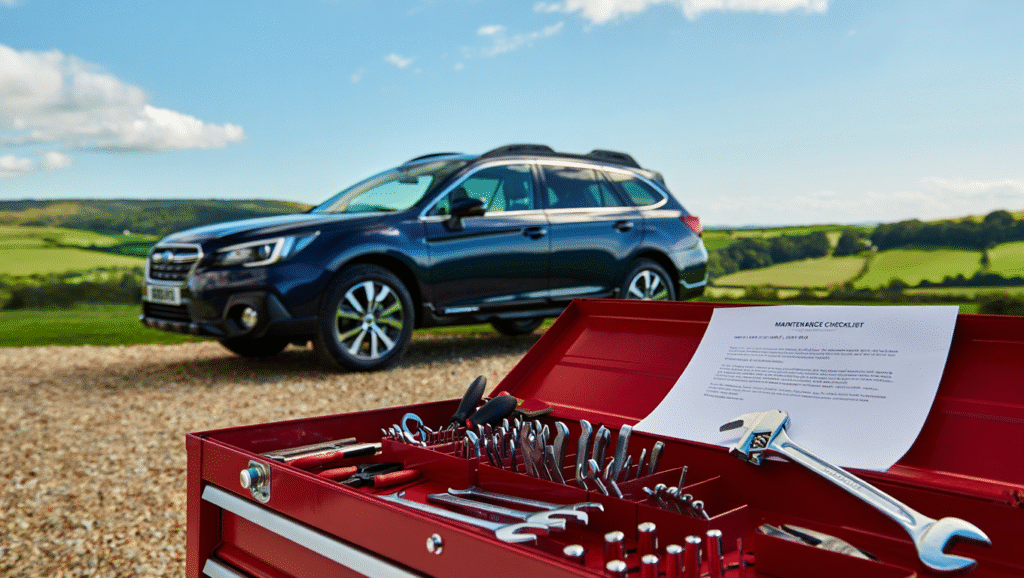
Thinking about buying a Subaru Outback or already own one? The Outback has been a popular choice for UK drivers who need a reliable vehicle that can handle both city streets and countryside terrain. But like all cars, this model has its share of problems. In this guide, we’ll walk through common Subaru Outback issues, how to spot them, and what to do to keep your car running smoothly.
Understanding Subaru Outback Reliability Concerns
The Subaru Outback’s reputation for being tough and long-lasting is well-deserved, but that doesn’t mean it’s perfect. If you’re wondering about Subaru Outback reliability concerns, knowing what to look out for can save you time, money, and stress.
How reliable is the Outback compared to other cars? Generally, they hold up well, but there are some recurring issues that pop up. Many owners report getting well beyond 100,000 miles on their Outbacks with proper care.
What affects the reliability of your Outback? Several factors come into play:
- How well previous owners looked after it
- Whether it’s had regular services
- The specific year and model (some years had more problems than others)
- The kind of driving you do (city vs. country roads)
Before buying a used Outback, it’s worth checking service records and asking about any recurring problems. A simple vehicle history check can reveal a lot about what you might expect.
Most Common Subaru Outback Problems
If you’re dealing with Subaru Outback common problems, it helps to know which issues show up most often. Here’s a breakdown of what many UK Outback owners face:
Head Gasket Failures
This is perhaps the most talked-about problem, especially in models from the early 2000s. Signs include:
- White smoke from the exhaust
- Coolant leaking or coolant levels dropping
- Engine overheating
- Sweet smell (from coolant) when the engine is running
If caught early, this can be less costly to fix. If ignored, it can lead to major engine damage.
Oil Consumption
Many Outback owners notice they need to top up oil between services. While some oil use is normal, excessive consumption might mean:
- Oil leaks from seals or gaskets
- Internal engine wear
- Piston ring issues
Keeping an eye on your oil levels is a simple habit that can prevent bigger problems.
Windscreen Wiper Motor Failures
This might seem small, but it’s a common complaint in UK models. When it rains (which, let’s face it, is often in Britain), a failed wiper motor means poor visibility and unsafe driving.
CVT Transmission Problems
Later models with the Continuously Variable Transmission (CVT) sometimes experience:
- Shuddering or jerking when accelerating
- Unusual noises
- Hesitation when changing speeds
These issues often show up between 60,000-100,000 miles.
Subaru Outback Engine Faults
The heart of your Outback is its engine, and Subaru Outback engine problems can range from minor to serious. Here’s what to watch for:
Oil Leaks
A common sight with aging Outbacks is oil spots on your driveway. These often come from:
- Valve cover gaskets
- Oil pan gaskets
- Front main seals
While annoying, these leaks are usually not urgent unless they’re severe.
Timing Belt Issues
For older Outbacks with timing belts (rather than chains), failure can be catastrophic. The belt should be changed according to the service schedule, usually around 105,000 miles. Don’t wait for it to break!
Cooling System Problems
The Outback’s cooling system can develop issues including:
- Radiator leaks
- Thermostat failures
- Water pump problems
If your temperature gauge starts climbing or you notice coolant puddles under the car, get it checked right away.
Regular oil changes and following the Subaru Outback service schedule are your best defenses against engine troubles.
Subaru Outback Transmission Issues
Transmission problems can be some of the most expensive to fix, so understanding Subaru Outback transmission issues is important.
CVT Transmission Concerns
Models from 2010 onwards use a CVT transmission that can experience:
- Hesitation when accelerating
- Shuddering or vibrating
- Unusual noises
- Sudden loss of power
Subaru extended the warranty on many CVT transmissions to 10 years or 100,000 miles because of these issues. Check if your car might be covered.
Manual Transmission Problems
For Outbacks with manual transmissions, watch for:
- Difficulty shifting gears
- Grinding noises
- Clutch slipping
- Fluid leaks
Changing transmission fluid according to schedule can prevent many of these problems.
Subaru Outback Electrical Problems
Modern cars rely heavily on electronics, and Subaru Outback electrical problems can be tricky to diagnose. Common electrical issues include:
Battery Drain
Many owners report batteries dying prematurely. This might be caused by:
- Faulty alternators
- Electrical components staying on when they shouldn’t
- Bad connections or grounds
Dashboard Warning Lights
Random warning lights appearing on the dashboard can indicate sensor issues rather than actual mechanical problems.
Entertainment System Glitches
The infotainment system in newer Outbacks sometimes freezes, restarts, or loses settings.
If you’re experiencing electrical problems, checking the battery and its connections is a good first step before heading to a garage.
Subaru Outback Suspension Troubles
The Outback’s suspension gives it that comfortable ride, but Subaru Outback suspension issues do crop up, especially in UK cars dealing with our notorious potholes.
Common suspension problems include:
- Worn control arm bushings causing clunking noises
- Failed ball joints leading to uneven tire wear
- Sagging rear suspension, particularly in heavily loaded cars
- Struts and shock absorbers wearing out
Listen for unusual noises when going over bumps and watch for uneven tire wear, as these are often the first signs of suspension troubles.
How to Fix Subaru Outback Problems: Maintenance Tips
The best way to deal with Subaru Outback issues is to prevent them in the first place. Here are some Subaru Outback maintenance tips:
Regular Oil Changes
Subarus can be sensitive to oil quality and change intervals. Stick to the schedule in your Subaru Outback Owner’s Manual.
Check Fluid Levels Often
Get in the habit of checking:
- Engine oil
- Coolant
- Brake fluid
- Power steering fluid
- Transmission fluid
Listen to Your Car
Many problems give audible warnings before they become serious. Unusual noises should never be ignored.
Keep Up with Scheduled Services
Following the maintenance schedule isn’t just a suggestion—it’s essential for preventing major problems.
Check for Recalls
Subaru occasionally issues recalls for safety or reliability issues. You can check if your car is affected through the UK government’s vehicle recall service.
Understand Your Warranty
Know what’s covered under your Subaru warranty and how long the coverage lasts.
Conclusion
The Subaru Outback is a capable, versatile car with a lot to offer UK drivers. While it does have its share of common issues, being aware of them means you can catch problems early and keep repair costs down.
Regular maintenance is key to avoiding most of the common Subaru Outback problems we’ve discussed. With proper care, your Outback can provide many years of reliable service, whether you’re commuting in London or exploring the Scottish Highlands.
Remember that finding a garage with specific Subaru experience can help ensure any issues are addressed by trained professionals familiar with the model.
If you find yourself needing some assistance on the roadside due to a breakdown don’t hesitate to get in touch and we can help you out in your tricky situation. Visit our site here or give us a ring on 01634 926801.
